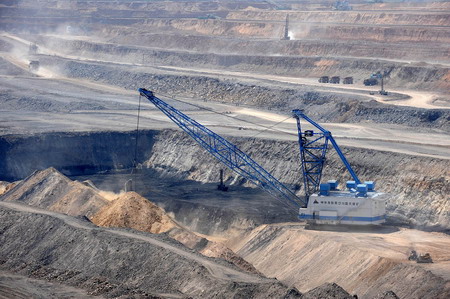Statistics
Resource tax set to boost local economy
By Li Xiang (China Daily)
Updated: 2010-07-09 09:18
 |
Large Medium Small |
|
 |
|
An open-cast coal mine in Inner Mongolia autonomous region. The National Development and Reform Commission said it would soon extend the pilot resource tax scheme across the entire nation. [Zhang Ling / Xinhua] |
On Thursday, the National Development and Reform Commission (NDRC), the country's top economic planner, announced a plan to extend the pilot tax scheme introduced last month in Xinjiang Uygur autonomous region to all 12 provinces and autonomous regions in the west and soon across the entire nation.
The benchmark rate will be set at 5 percent and vary across commodities, according to the NDRC. The levy will be based on prices instead of the volume of the commodities produced and will be broadened to apply to coal, crude oil and natural gas.
Industry analysts said that the new tax policy will reduce the profitability of major resource producers such as PetroChina Co Ltd and China Petroleum and Chemical Corp, known as Sinopec, as it will result in higher tax costs for them.
"We estimate that PetroChina and Sinopec will see an increase in resource tax payments of 17.9 billion yuan ($2.64 billion) and 6.4 billion yuan respectively if the reform goes nationwide," said Yan Beina, a Shanghai-based analyst at Guosen Securities.
"That would bring down their earnings per share by 0.07 yuan and 0.06 yuan respectively," she added.
The country's top coal miners, including China Shenhua Energy Co Ltd and China Coal Energy Co Ltd, will also be affected by the tax, but the impact varies based on their exposure to the region, analysts said.
|
||||
Jing Ulrich, managing director and chairman of China equities and commodities at JP Morgan Chase & Co, noted in a report that policymakers in Beijing may establish a lower tax rate for coal which serves as the country's mainstay fuel than for natural gas and crude oil amid concerns over inflation and maintaining the profitability of downstream industries.
The resource tax reform is also widely considered a significant move by the central government to support local economies in the resource-rich western regions that remain underdeveloped relative to the country's coastal areas, Ulrich said.
"The reform will help reduce economic imbalances between the lesser-developed but resource-rich regions of western China and the nation's coastal centers," she said. "It will also bolster local government finances since a higher proportion of the resource tax will be paid locally."
The resources tax reform is part of a new round of Beijing's supportive measure to boost the country's western regions which include the 682.2 billion yuan investment in 23 new major infrastructure projects and the continuation of a preferential 15 percent corporate income tax rate for a period of ten years to support the development of favored industries in western regions.
Market watchers said that, in the long term, the favorable policies will boost local economies and market confidence.



